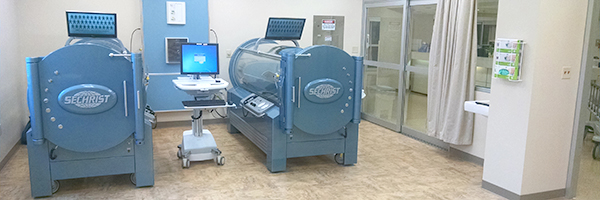ER WAIT
iER WAIT
iHyperbaric Oxygen Therapy (HBOT) provides patients with pure oxygen in a pressurized environment to treat decompression sickness, serious infections and wounds that are difficult to heal. While receiving HBOT, patients lie on a stretcher inside a pressurized chamber.
While inside the air chamber, patients breathe in 100 percent oxygen. The air pressure inside the chamber is two to three times higher than normal air pressure, which allows the patient's lungs to intake more oxygen than possible at normal air pressure. The patient's blood carries the extra oxygen throughout his or her body to help fight bacteria and promote healing.

If you have a wound that hasn’t healed, speak with your provider about the benefits of HBOT. Your provider will evaluate your wound and if he or she determines that HBOT is beneficial for healing your wound, you will receive a referral to the Wound Care Center.
To protect the privacy of our patients, family members are asked to remain in the waiting area during your treatment. A trained staff member will remain in the room with you during your treatment and you may communicate with them at any time.
The safety of our patients is our priority. Patients will be provided with appropriate clothing to wear during the treatment. We ask that you not wear any of the following items when you come to the Center for HBOT:
Treatment is different for everyone, and the number of treatments is dependent upon the patient’s condition and response to therapy. Most patients receive between 30 and 40 treatments.
Each treatment will last approximately two hours.
The HBOT technician will check your vital signs, listen to your lungs and examine your ears. The technician will assess your pain level as well. If you have diabetes, your blood sugar will be checked. Safety checks will be completed prior to each treatment.
HBOT is not painful. At the beginning of your treatment, you may feel pressure in your ears, similar to when you fly in a plane or drive up into the mountains, which you may have to clear. A staff member will instruct you on methods for clearing your ears, such as swallowing, yawning and opening and closing your mouth.
It is important to tell your provider and/or technician if you have the following items:
Your provider will discuss blood sugar control with you. The HBOT technician will check your blood sugar before and after treatment. Take your medicine as prescribed and be sure to eat before your scheduled treatment.
When you are in the chamber you can see out in all directions. A staff member will remain with you during your treatment to help ease your anxiety. If you are anxious, your provider can prescribe medicine to help you relax.
Medicare has approved coverage for HBOT for many types of chronic non-healing wounds. Most private insurance companies follow Medicare rules. A staff member will review your insurance plan and coverage with you prior to beginning therapy to ensure you are aware of any related expense.